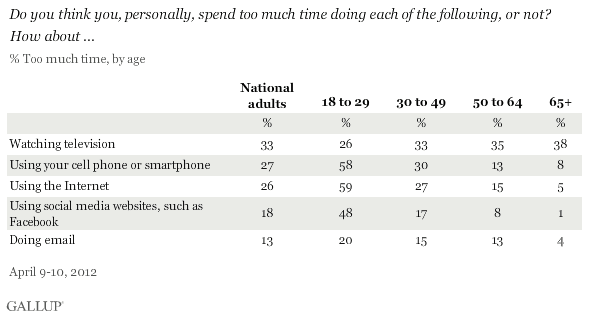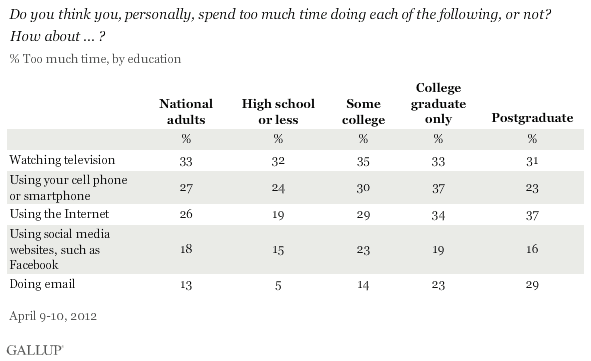PRINCETON, NJ -- By their own admission, many young Americans, aged 18 to 29, say they spend too much time using the Internet (59%), their cell phones or smartphones (58%), and social media sites such as Facebook (48%). Americans' perceptions that they spend "too much" time using each of these technologies decline with age. Conversely, older Americans are most likely to say they spend too much time watching television, and among all Americans, television is the most overused technology tested.

These results are based on answers to questions included in Gallup Daily tracking interviewing conducted April 9-10, asking Americans if they spend too much time on five activities involving "screens" -- using cell phones or smartphones, doing email, using social media sites such as Facebook, using the Internet, and watching television. Not all Americans engage in each of these activities, of course, which may help explain why older Americans are not likely to say they spend too much time on Internet-, social media-, and cell phone-related pursuits.
Forty-seven percent of Americans, including 78% of those aged 18 to 29, report owning a smartphone, and of these, 48% say they spend too much time using it.
Email appears to be less of a time concern to Americans overall than using cell phones or using the Internet more generally. Twenty percent of those under 30 say they spend too much time with emails; this drops to 4% among those 65 and older.
Highly Educated Most Likely to Report Too Much Time Spent Using Email, Internet
Highly educated Americans are more likely to say they spend too much time doing email and on the Internet than are those with less education. Education is not highly related to the other three activities.

Overall, 33% of all U.S. adults report spending too much time watching television, 27% too much time on cell phones and smartphones, and 26% too much use of the Internet -- with fewer than two in 10 saying they spend too much time on social media sites or doing email.
Americans' concern about spending too much time watching television is not a new phenomenon. A Gallup poll conducted in 1990, using a somewhat different question wording, found that 42% of Americans said they spent too much time watching television -- and in that survey, 13% said they were addicted to television.
Implications
Most new technologies have good and bad dimensions. The Internet, email, cell phones and smartphones, and social media sites have opened up entirely new ways in which Americans go about their daily personal and work lives -- and are no doubt considered indispensable by many Americans who use them. These technologies have also, of course, spawned whole new industries and have been the basis for some of the fastest-growing companies in the world.
At the same time, it is apparent that many in the U.S., mostly younger Americans, have become aware that these technologies may have a downside, namely that they use up too much time.
It is possible that younger Americans -- concerned about their use of time -- will attempt to scale back their use of the new technologies. This could affect the exponential growth of the industries built on the technologies in the future. On the other hand, recognition of negative aspects of engaging in certain activities doesn't necessarily mean people are able to stop doing them -- as witnessed by those who would like to quit smoking but can't, and those who would like to lose weight but don't.
All in all, the fact that six in 10 18- to 29-year-olds say they spend too much time using their phones and using the Internet suggests at least the potential of a backlash of sorts, which in turn could have unknown but possibly significant consequences in the years ahead.
Survey Methods
Results are based on telephone interviews conducted as part of Gallup Daily tracking April 9-10, 2012, with a random sample of 1,051 adults, aged 18 and older, living in all 50 U.S. states and the District of Columbia.
For results based on the total sample of national adults, one can say with 95% confidence that the maximum margin of sampling error is ±4 percentage points.
Interviews are conducted with respondents on landline telephones and cellular phones, with interviews conducted in Spanish for respondents who are primarily Spanish-speaking. Each sample includes a minimum quota of 400 cell phone respondents and 600 landline respondents per 1,000 national adults, with additional minimum quotas among landline respondents by region. Landline telephone numbers are chosen at random among listed telephone numbers. Cell phone numbers are selected using random-digit-dial methods. Landline respondents are chosen at random within each household on the basis of which member had the most recent birthday.
Samples are weighted by gender, age, race, Hispanic ethnicity, education, region, adults in the household, and phone status (cell phone only/landline only/both, cell phone mostly, and having an unlisted landline number). Demographic weighting targets are based on the March 2011 Current Population Survey figures for the aged 18 and older non-institutionalized population living in U.S. telephone households. All reported margins of sampling error include the computed design effects for weighting and sample design.
In addition to sampling error, question wording and practical difficulties in conducting surveys can introduce error or bias into the findings of public opinion polls.
For more details on Gallup's polling methodology, visit www.gallup.com.
